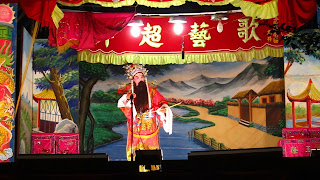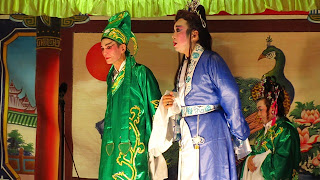I stumbled upon this make-shift wooden stage on the grounds of a temple near my house.There was a performance being held there and being very interested in this Chinese art form I decided to take a look.

The actors and actresses were resplendent in glittering costumes of brilliant hues and the backdrop of the stage was probably sewn and embroidered by a dying breed of tradesmen or tradeswomen in China or Taiwan. A banner above had four characters that explained the purpose of the performance which was to thank the God of the Temple for having granted a favour. So we deduced that someone had been blessed in some way by the God and he or she hired this opera troupe to perform for the God as an act of gratitude.
When I was a child, street operas were more common especially during the seventh lunar month of the Chinese calendar which is the annual Ghost Festival. As years went by the popularity of these performances diminished due to a lack of interest and the inability to understand Chinese dialects amongst the younger generation as these operas were inevitably performed using local dialects - Cantonese, Hokkien and Teochew. My interest in Chinese opera, in particular Cantonese opera, came a little too late in life. It is a pity that at a time when I am truly interested in Chinese language and art, Chinese Opera does not look like it will stay around for the next five years.
Although I only watched the middle section of this opera I was able to get the gist of the story based on my very limited understanding of Hokkien and watching the body language and facial expressions of the actors and of course listening to the tone of voice when they were singing or speaking.
The story is about this man who was not of a very fine character who had two wives - one who was his age and the other, a much younger one. Apparently the three were living harmoniously under one roof.
This is the God of Fortune. I could not grasp what he was up to exactly but it looked like there was something he wanted to get to the bottom of.
The God of Fortune was joined by Tua Pek Kong who was also the Deity of the temple where the performance was held. They seemed to be arguing about something and at the end of it they struck some kind of a deal.
As the singing was rather lengthy my attention diverted to the temple next to the stage.
The God of Fortune was going to go down to Earth to prove a point.
On Earth, the man with the two wives was out in the night probably on his way home after a night of revelry.
He decided to lie down to take a rest from all that singing and as he slept, the God of Fortune appeared disguised as a beggar.
He asked the man for some money to buy food and the man beat him up for bothering him. I have no photos of this scene. After he walked off in a huff leaving the 'beggar' on the ground, Tua Pek Kong, the deity of the temple appeared with a "I-told-you-so" song.
The backdrop was about to be changed. This was done in a very efficient way as the various backdrops were rolled up like a scroll above the stage and each one could be rolled up or let down very easily.
The new backdrop represented the interior of a weathy man's house.
Here is the brother of the man who had unwittingly beaten up the God of Fortune earlier.
This is his wife and they appeared to be very happy together.
He was also bidding his wife farewell as he had to go his brother's house to ask a favour of some sort.
Here's the merry trio before the arrival of the man's brother.
See the second wife's costume. It has taken its inspiration from the Star Trek costumes.
I love Chinese Opera because of the beautiful costumes and the head ornaments.
The brother arrived and was introduced to the man's second wife who was more his age but not his type.
As it was getting late, the man asked his brother to stay the night and here he is taking leave of his family to retire to the bedroom.
Now we discover that the second wife is actually a schemer. What she is scheming I could tell but the reason was not clear to me.
Late in the night, the second wife knocked on the door of her brother-in-law to offer some tea to him. Actually it was an excuse to get into his room.
She tried ways and means to seduce him.
He told her off rather politely saying that it was not proper for her to be seen in his room as in olden China, a man and a woman not married to each other should not be together alone at all times.
She begged to differ and gave a long-winded excuse not to leave.
Just then, the man's first wife was passing by and was shocked to see the second wife with the brother-in-law alone in the room. To save herself from disgrace, the second wife ran out of the room crying accusing the brother-in-law of some inappropriate behaviour.
The two wives summoned their husband and told tales about his brother. The man was infuriated and he beat his brother up.
At this point, I had to leave the performance before it ended. It probably had one-third more to go. I do not know when I will be able to come across another Chinese Opera performance. Street performances are ad hoc and the professional troupes from Guangzhou and Hong Kong that I used to pay to watch do not come here often.While surfing for more information on Chinese Operas I found this site that gives a rough guide on opera performances in Singapore and also links to people who are interested in this dying art form in one way or another.























































